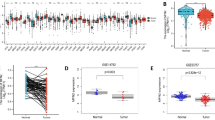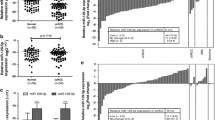Abstract
Background
To investigate the role of Minichromosome maintenance protein 5 (MCM5) in the clinical prognosis and biological function of renal cell carcinoma (RCC).
Methods
The Oncomine database was analysed to determine the differential expression of MCMs in RCC. A total of 50 RCC tissues were evaluated by immunohistochemistry (IHC), and the association between MCM5 and clinicopathologic features was determined. Kaplan–Meier curves and the log-rank test were applied for survival analysis. MCM5 expression in RCC tissues and cell lines was examined further by Western blotting. To explore the biological function of MCM5 in RCC, RCC cell lines (786-0, 769p) were transfected with shRNA-MCM5 or MCM5. Cell proliferation was assessed using MTT and colony-formation assays. Tumour xenografts were generated in nude mice to confirm the effects of MCM5 on tumour growth.
Results
MCM5 was significantly overexpressed in RCC tissues; this outcome was confirmed by the Oncomine database, IHC and Western blotting. IHC and LinkedOmics analysis demonstrated that the MCM5 expression was significantly associated with pathological stage, lymph node status, distant metastasis, and TNM stage (p < 0.05) but not with sex, age, position, or tumour size (p > 0.05). Furthermore, high MCM5 levels correlated with unfavourable clinical outcomes in RCC (p < 0.05). Additionally, MCM5 silencing inhibited RCC cell line proliferation and reduced 786-0 xenograft tumour growth; in contrast, MCM5 upregulation promoted cell proliferation.
Conclusion
MCM5 overexpression is associated with malignant status and poor prognosis in RCC. Additionally, MCM5 plays an important role in proliferation and may be a potential prognostic marker and novel therapeutic target for RCC.




Similar content being viewed by others
References
Siegel RL, Miller KD, Jemal A (2017) Cancer statistics, 2017. CA Cancer J Clin 67:7–30
Bhatt JR, Finelli A (2014) Landmarks in the diagnosis and treatment of renal cell carcinoma. Nat Rev Urol 11:517–525
Siegel RL, Miller KD, Jemal A (2018) Cancer statistics, 2018. CA Cancer J Clin 68:7–30
Jonasch E, Gao J, Rathmell WK (2014) Renal cell carcinoma. BMJ 349:g4797
Chen D, Zhu M, Su H et al (2018) LINC00961 restrains cancer progression via modulating epithelial-mesenchymal transition in renal cell carcinoma. J Cell Physiol 234(5):7257–7265
Li P, Wong YN, Armstrong K et al (2016) Survival among patients with advanced renal cell carcinoma in the pretargeted versus targeted therapy eras. Cancer Med 5:169–181
Tye BK (1999) MCM proteins in DNA replication. Annu Rev Biochem 68:649–686
Giaginis C, Georgiadou M, Dimakopoulou K et al (2009) Clinical significance of MCM-2 and MCM-5 expression in colon cancer: association with clinicopathological parameters and tumor proliferative capacity. Dig Dis Sci 54:282–291
Giaginis C, Vgenopoulou S, Vielh P et al (2010) MCM proteins as diagnostic and prognostic tumor markers in the clinical setting. Histol Histopathol 25:351–370
Gou K, Liu J, Feng X et al (2018) Expression of minichromosome maintenance proteins (MCM) and cancer prognosis: a meta-analysis. J Cancer 9:1518–1526
Yu SY, Wang YP, Chang JY et al (2014) Increased expression of MCM5 is significantly associated with aggressive progression and poor prognosis of oral squamous cell carcinoma. J Oral Pathol Med 43:344–349
Liu YZ, Wang BS, Jiang YY et al (2017) MCMs expression in lung cancer: implication of prognostic significance. J Cancer 8:3641–3647
Giaginis C, Giagini A, Tsourouflis G et al (2011) MCM-2 and MCM-5 expression in gastric adenocarcinoma: clinical significance and comparison with Ki-67 proliferative marker. Dig Dis Sci 56:777–785
Wang D, Li Q, Li Y et al (2018) The role of MCM5 expression in cervical cancer: Correlation with progression and prognosis. Biomed Pharmacother 98:165–172
Kelly JD, Dudderidge TJ, Wollenschlaeger A et al (2012) Bladder cancer diagnosis and identification of clinically significant disease by combined urinary detection of Mcm5 and nuclear matrix protein 22. PLoS ONE 7:e40305
Rodins K, Cheale M, Coleman N et al (2002) Minichromosome maintenance protein 2 expression in normal kidney and renal cell carcinomas: relationship to tumor dormancy and potential clinical utility. Clin Cancer Res 8:1075–1081
Donaldson AD, Blow JJ (1999) The regulation of replication origin activation. Curr Opin Genet Dev 9:62–68
Bell SP, Dutta A (2002) DNA replication in eukaryotic cells. Annu Rev Biochem 71:333–374
Zhong H, Chen B, Neves H et al (2017) Expression of minichromosome maintenance genes in renal cell carcinoma. Cancer Manag Res 9:637–647
Mehdi MZ, Nagi AH, Naseem N (2016) MCM - 2 and Ki - 67 as proliferation markers in renal cell carcinoma: a quantitative and semi-quantitative analysis. Int Braz J Urol 42:1121–1128
Kanu N, Gronroos E, Martinez P et al (2015) SETD2 loss-of-function promotes renal cancer branched evolution through replication stress and impaired DNA repair. Oncogene 34:5699–5708
Murphy N, Ring M, Heffron CC et al (2005) Quantitation of CDC6 and MCM5 mRNA in cervical intraepithelial neoplasia and invasive squamous cell carcinoma of the cervix. Mod Pathol 18:844–849
Burger M (2009) MCM2 and MCM5 as prognostic markers in colon cancer: a worthwhile approach. Dig Dis Sci 54:197–198
Eissa S, Matboli M, Shehata HH et al (2015) MicroRNA-10b and minichromosome maintenance complex component 5 gene as prognostic biomarkers in breast cancer. Tumour Biol 36:4487–4494
Brems-Eskildsen AS, Zieger K, Toldbod H et al (2010) Prediction and diagnosis of bladder cancer recurrence based on urinary content of hTERT, SENP1, PPP1CA, and MCM5 transcripts. BMC Cancer 10:646
Liao X, Han C, Wang X et al (2018) Prognostic value of minichromosome maintenance mRNA expression in early-stage pancreatic ductal adenocarcinoma patients after pancreaticoduodenectomy. Cancer Manag Res 10:3255–3271
Wang D, Zhu H, Guo M (2018) Expression and prognostic value of cell-cycle-associated genes in gastric adenocarcinoma. BMC Gastroenterol 18:81
Williams GH, Swinn R, Prevost AT et al (2004) Diagnosis of oesophageal cancer by detection of minichromosome maintenance 5 protein in gastric aspirates. Br J Cancer 91:714–719
Keane MG, Huggett MT, Chapman MH et al (2017) Diagnosis of pancreaticobiliary malignancy by detection of minichromosome maintenance protein 5 in biliary brush cytology. Br J Cancer 116:349–355
Dudderidge TJ, Kelly JD, Wollenschlaeger A et al (2010) Diagnosis of prostate cancer by detection of minichromosome maintenance 5 protein in urine sediments. Br J Cancer 103:701–707
Remus D, Beuron F, Tolun G et al (2009) Concerted loading of Mcm2-7 double hexamers around DNA during DNA replication origin licensing. Cell 139:719–730
Su Z, Zheng X, Zhang X et al (2017) Sox10 regulates skin melanocyte proliferation by activating the DNA replication licensing factor MCM5. J Dermatol Sci 85:216–225
Agarwal MK, Ruhul Amin AR, Agarwal ML (2007) DNA replication licensing factor minichromosome maintenance deficient 5 rescues p53-mediated growth arrest. Cancer Res 67:116–121
Gakiopoulou H, Korkolopoulou P, Levidou G et al (2007) Minichromosome maintenance proteins 2 and 5 in non-benign epithelial ovarian tumours: relationship with cell cycle regulators and prognostic implications. Br J Cancer 97:1124–1134
Mio C, Lavarone E, Conzatti K et al (2016) MCM5 as a target of BET inhibitors in thyroid cancer cells. Endocr Relat Cancer 23:335–347
Hsu I, Chuang KL, Slavin S et al (2014) Suppression of ERbeta signaling via ERbeta knockout or antagonist protects against bladder cancer development. Carcinogenesis 35:651–661
Funding
This study is supported by National Natural Science Foundation of China (NSFC) [81460137].
Author information
Authors and Affiliations
Corresponding authors
Ethics declarations
Conflict of interest
The authors declare that they have no competing interests.
Ethical approval
The study has been approved by the Ethics Committee of the First Affiliated Hospital of Nanchang University.
Informed consent
Informed consent was provided by all patients who provided clinical specimens.
Additional information
Publisher's Note
Springer Nature remains neutral with regard to jurisdictional claims in published maps and institutional affiliations.
Rights and permissions
About this article
Cite this article
Gong, B., Ma, M., Yang, X. et al. MCM5 promotes tumour proliferation and correlates with the progression and prognosis of renal cell carcinoma. Int Urol Nephrol 51, 1517–1526 (2019). https://doi.org/10.1007/s11255-019-02169-3
Received:
Accepted:
Published:
Issue Date:
DOI: https://doi.org/10.1007/s11255-019-02169-3




